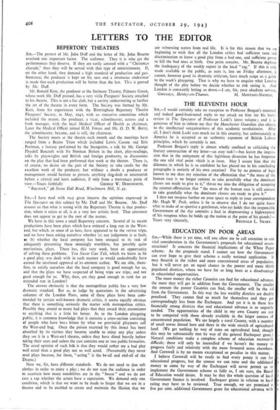Sta,—I have read with very great interest the opinions expressed
in The Spectator on this subject by 'Mr. Duff and Mr. Bourne. Mr. Duff assures us that what is wrong with the Repertory Theatre is that produc- tion, where it exists at all, is at a very low artistic level. That utterance does not appear to get to the root of the matter.
We have in this town a small Repertory concern. Several of its recent productions have been plays which have enjoyed a long run in the West- end, but which, to some of us here, have appeared to be the veriest tripe, and we have been asking ourselves whether (a) our judgement is at fault, (b) whether the local company has been unequal to its task of adequately presenting these seemingly worthless, but possibly quite meritorious, plays. There has, this very week, been an opportunity of solving these problems. You Never Can Tell, which we knew to be a good play, was dealt with in such manner as would undoubtedly have earned the unstinted approval of its eminent author. We are able, there- fore, to satisfy ourselves that the local company is good enough for us, and that the plays we have suspected of being tripe are tripe, and not good enough for us. Why, then, are they good enough to rank for an extended run in London?
The answer obviously is that the metropolitan public has a very low dramatic standard. But as, to judge .by quotations in the advertising columns of the London Press, some of these plays have been com- mended by certain well-known dramatic critics, it seems equally obvious that there is something seriously the matter with metropolitan critics. Possibly they attend so many bad plays that they award their, encomiums to anything that is a little bit better. As to the London playgoing public, it is common knowledge that it contains a cross-section consisting of people who have beea bitten by what we provincial playgoers call the West-end bug. Once the poison excreted by this insect has been absorbed by its victims they become unable to enjoy any play unless they see it in a West-eni theatre, unless they have dined heavily before taking their seats and unless the cast contains one or two public favourites. The usual opinion of such folk is that they would rather see a bad play well acted than a good play not so well acted. (Presumably they never read plays because, for them, " acting " is the be-all and end-all of the Drama.)
Now we, Sir, have different standards. We do not need to don soft clothes in order to enjoy a play ; we do not scan the audience in order to ascertain how many notabilities are in the " house " and we do not care a rap whether the actors have a reputation. We demand only one condition, which is that we want to be made to forget that we are in a theatre and to be enabled to create and maintain the illusion that we
are witnessing scenes from real life. It is for this reason that we are beginning to wish that all the London critics had sufficient taste and discrimination to know a good play from a bad one, and sufficient power to kill the bad ones at birth. One point remains. Mr. Bourne deplores the inadequacy of the weekly report in the local " rag." If this is only made available to the public, as ours is, late on Friday afternoon, it cannot, however good its dramatic criticism, have much scope as a guide to the week's playgoing. That is why we have to enquire what London thought of the play before we decide whether to risk seeing it. And London is constantly letting us down.—I am, Sir, your obedient servant,


























 Previous page
Previous page